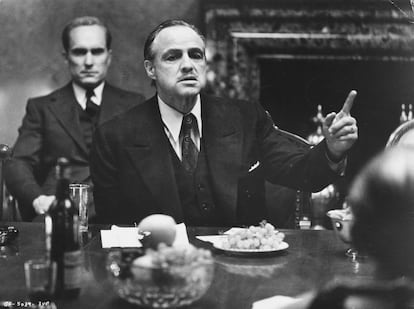Lessons on power from Don Vito Corleone
The academic Alberto Mayol finds a master class in the ‘The Godfather’ on how to gain and maintain power without moral considerations

In one of the most memorable moments of the animated series Family Guy, the Griffins are about to die and Peter, the bereaved patriarch, decides to tell his family one last secret: “I did not care for The Godfather.” His wife and children remind him that it is a masterpiece, a visual poem, “the great American tragedy.”
If the joke works, it’s because (almost) everyone likes The Godfather. Coppola’s trilogy is one of those cultural artifacts that generates a rare consensus, a popular classic that is at the same time fodder for cinephiles, an instant hit that maintains its reputation intact five decades later. Alberto Mayol, a sociologist, political scientist and writer, has also found both the films and Mario Puzo’s novel offer a tool for reflection and learning. The Godfather, he argues, is “a crash course in power: how to get it, keep it, increase it, and wield it.” It is demonstrated in the unbiased, amoral prowess of Vito Corleone and his son Michael, heir to his empire.
Mayol is currently promoting the Spanish edition of The 50 Laws of Power in The Godfather, an illuminating document for that silent majority that has never reflected on the nature of power and, therefore, is condemned to suffer from it. Looking back, the author remembers that he came into contact with the film saga in 1990, when the third installment was released in Chile: “My uncle insisted that we go see it, even though I was a minor. His argument, scandalous for the orderly child that I was at the time, was that in order to really enjoy a film like this, you first have to break a law.”
Years later, Mayol would surprise himself by returning again and again to sequences like the one with the horse’s head between the silky sheets of a Hollywood producer, finding in them “a very profound reflection, by no means trivial, on that mythological god that we call power, which is behind almost all social relations, not just in politics.” That intuition gave rise to a popular series of seminars on The Godfather and an even more popular podcast, La Cosa Nostra, which grew and spread its tentacles during the pandemic. And from there was born the book.
During the opening day of his seminar, Mayol used to say, jokingly, that his is “an essentially right-wing analytical method, because it starts from the most stark pragmatism.” He cites specific examples to unravel the inexorable Corleone logic, and he reaches revealing conclusions: “Don Vito always exercised power without inhibitions, but with good sense and moderation.” His best students would have to be found in the conservative spectrum, in Winston Churchill, Giulio Andreotti and Angela Merkel, as well as in the back rooms of such formidable and opaque nuclei of power as “the CIA, the Vatican or the boards of directors of multinationals.” The western left, in his opinion, “does not generate leaders, because it has gotten stuck in a discourse of resistance to power that condemns it to ineffectiveness.” The same could be said of the bulk of the citizens of communitarian Europe, “herbivores in a world of carnivores,” some of them as voracious as Vladimir Putin, “who not only poison their opponents, but want it to be known.”
Sign up for our weekly newsletter to get more English-language news coverage from EL PAÍS USA Edition
Tu suscripción se está usando en otro dispositivo
¿Quieres añadir otro usuario a tu suscripción?
Si continúas leyendo en este dispositivo, no se podrá leer en el otro.
FlechaTu suscripción se está usando en otro dispositivo y solo puedes acceder a EL PAÍS desde un dispositivo a la vez.
Si quieres compartir tu cuenta, cambia tu suscripción a la modalidad Premium, así podrás añadir otro usuario. Cada uno accederá con su propia cuenta de email, lo que os permitirá personalizar vuestra experiencia en EL PAÍS.
¿Tienes una suscripción de empresa? Accede aquí para contratar más cuentas.
En el caso de no saber quién está usando tu cuenta, te recomendamos cambiar tu contraseña aquí.
Si decides continuar compartiendo tu cuenta, este mensaje se mostrará en tu dispositivo y en el de la otra persona que está usando tu cuenta de forma indefinida, afectando a tu experiencia de lectura. Puedes consultar aquí los términos y condiciones de la suscripción digital.









































